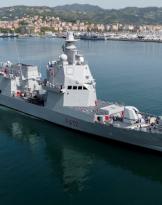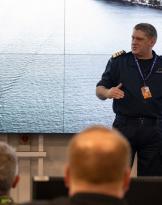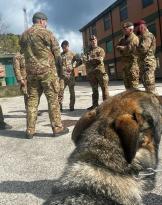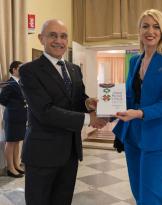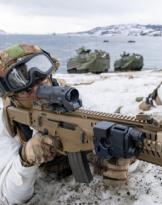A month of Gabinia by Ship Borsini under the banner of Italy's commitment to combat piracy. The offshore patrol vessel of the Navy, released its moorings last April 27 from the Augusta Naval Base, after an initial period of participation in the operation Safe Mediterranean, left for the Gulf of Guinea to patrol one of the stretches of sea in the world with the highest risk linked to piracy attacks. The operation Gabinia it constitutes an important opportunity to learn more about local realities and strengthen cooperation with coastal countries.
Ship Borsini during its deployment in front of the African coasts, bathed by the Atlantic Ocean, it stopped, from 21 to 23 May, in Lagos, Nigeria, and took part in the Presidential Fleet Review 23 in honor of the President of Nigeria, Muhammadu Buhari. Present at the parade along the Apapa Chanel in Lagos, in addition to Nave Borsini, four Nigerian units and one Ghanaian Navy unit.
The event celebrated the maritime surveillance operations of the Nigerian Navy, which have helped to get Nigeria out of the piracy list published by the International Maritime Bureau (IMB).
In the latest quarterly reports of the IMB, in fact, the lowest number of maritime piracy episodes from 1993 to today was recorded. In particular, the Gulf of Guinea was the scene of only five incidents in the first quarter of this year, an excellent result in consideration of the eight piracy incidents that occurred in the same period of 2022 and sixteen of 2021. This result was possible thanks to the commitment of the Nigerian navy on the one hand, and of navies such as the Italian one on the other, the Navy which continuously deploys a ship in that sea area, with patrolling and intervention tasks in the event of an accident and supports the growth of the navies bordering the area, in order to increase their patrolling and intervention capabilities.
However, this result must be consolidated through the action of the command and control centers of the coastal states as well as the deterrent power of the presence of military ships. The importance of the role of the latter in the area was also highlighted by the director of the IMB, Michael Howlett, who affirmed the importance of the anti-piracy activity carried out by the naval instrument for the prevention and immediate response to the phenomenon ( piracy that risks undermining international trade, which uses 85% of the seaways, as well as the safety of workers in the sector).
Left the port of Lagos, Ship Borsini resumed the sea to head to Abidjan, in the Ivory Coast, but not before having carried out joint activity with two Nigerian ships, the NNS Ikenne and the NNS Kano. The exercise was an opportunity for discussion between two Navies engaged in the fight against maritime piracy which hinders the economic growth of the countries bordering the Gulf of Guinea and jeopardizes the security of international trade routes in that stretch of sea to the west of the African continent. Ship's commitment Borsini in the operation Gabinia will last until July and in the coming weeks it is scheduled to sail, from Walvs Bay, Namibia, to Baleine Field, in theoffshore of the Ivory Coast.


